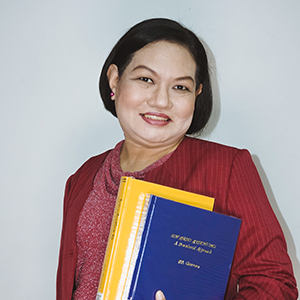Mrs. Stella May Cabeliza is a Senior High School Research faculty who has organized the first and second José Rizal University (JRU) Senior High School Research Congress as a former Researchers’ Club adviser. Dr.ChingLimjap and the former Director Dr. Barbie Wong-Fernandez were the keynote speakers of the said events.Stella, as she is fondly called, has presented research papers in conferences supported by the JRU Research Office, Senior High School Division and Graduate School. Aside from this year’s conference in Malaysia, she has presented research papers in Vietnam and Bangkok.Some of these papers have been published in international publications.
She obtained her Master of Arts in Language and Literature Instruction from the Rizal Technological University. She graduated with a degree of Bachelor of Arts in Communication major in Communication Research from the University of the Philippines Diliman.Her research interests include education, management, marketing and branding, aside from feminist analysis.
Prior to teaching, she has worked as a marketing researcher in the advertising, education and marketing research industries, as well as a manager in the healthcare and printing industries. She is currently writing her dissertation to complete her Doctor of Education studies at the JRU Graduate School.
Schools create progressive communities through outreach programs. José Rizal University Graduate School students under Dr. Maria Renita F. Fabic‘s Advanced Research Statistics and Problem Solving and Decision Making classes, conducted three community outreach projects among the Senior High School students of Culiat High School, Alternative Learning System students of Addition Hills Integrated School and prisoners of the Tagaytay City Jail with the theme ―Bringing Education to the Communitieson March and April 2019. The graduate students made this study from planning to implementation to evaluation. In the evaluation, the study determined to know the following: 1) knowledge of the respondents toward JRU outreach projects 2) satisfaction rating on the projects 3) feedback about these projects and 4) proposed interventions on future projects. Findings showed that the respondents were not able to identify their role as beneficiaries in the program. Respondents assessed the projects with a weighted mean of 3.54 interpreted as high assessment level with regard to venue, topic, speaker and materials used. Females assessed differently the projects compared to males. When grouped according to age group, venue, and speaker, assessment varies significantly. Respondents‘comments emphasized the importance of the Research lecture to their studies. Recommended intervention methods are the modification of the training evaluation questionnaire for easy accomplishment by the respondents and youth camp for the students and listening brigade for the prisoners.

